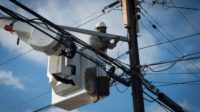The U.S. Agency for International Development is launching a new program to assist the rebuilding of Ukraine’s energy infrastructure and integrate the country into the European energy grid. To support the effort, the agency recently awarded a five-year, $439-million single-award contract to Tetra Tech Inc., Pasadena, Calif., to provide strategic technical and procurement assistance to improve the “resilience, reliability, affordability, and security” of the country's electric, natural gas and district heating sectors.
Since Russia's invasion of the country in 2022, its armed forces have “systematically attacked Ukraine’s energy infrastructure” impacting millions of people, said Isobel Coleman, USAID deputy administrator in a video the agency posted online.
“In response, brave repair and construction workers have risen to fix Ukraine’s energy grid at great risk to their own lives, and the United States has provided over $1 billion of assistance to replace and restore the energy grid, and there is more to come,” she said.
USAID’s new Securing Power, Advancing Resilience and Connectivity (SPARC) program is planned to build on the assistance the agency has already provided to Ukraine to help with both immediate and long-term energy needs, according to a spokesperson. The agency declined to identify specific projects that will be included under the contract, citing the “sensitive” nature of the work. It also declined to say how workers can be protected from attacks, but in a statement, said the “safety of our staff, partners, and beneficiaries is of paramount concern.”
USAID has initially planned to provide $190 million toward the Tetra Tech contract, and future funding is subject to availability.
Tetra Tech said in a statement that it would support Ukraine’s efforts to meet the requirements for integration with the European Union. Crown Agents, a not-for-profit development agency based in the U.K., also announced that it had subcontracted with Tetra Tech to procure equipment to address priorities identified by the Ukrainian government.
Drones and Missiles
On March 22, USAID said Russia launched its largest attack yet against Ukraine’s energy infrastructure, highlighting the need for this assistance. That attack included more than 60 explosive drones and 90 missiles against power plants and other civilian infrastructure, the Associated Press reported. DTEK Group, the largest energy company in Ukraine, said the attacks temporarily knocked out half of its available generating capacity. Another attack one week later with 60 drones and 39 missiles seriously damaged five of DTEK’s six operating power stations.
At the time, DTEK CEO Maxim Timchenko said in a statement that the country needs emergency supplies and longer-term assistance to build distributed generation such as wind farms that are less vulnerable—as well as stronger air defenses.
Russia has continued targeting Ukraine’s power infrastructure since then. Another missile and drone attack on May 8 damaged three DTEK thermal power plants, according to the company. Ukraine’s Ministry of Energy says damage to the country’s power system has totaled $11.5 billion.
USAID has so far delivered more than 4,200 generators, 55 transformers, 91 cogeneration units, 125 km of pipes, 74 excavators plus emergency shelters, mobile boiler houses and other supplies to Ukraine, according to Coleman. Through SPARC, the agency plans to support reforms, regulations and other preparations to further integrate Ukraine’s energy system with Europe’s, and to draw more private sector investment in sustainable energy for the country.
“What we know is, to build a truly resilient energy sector, that sector needs to be integrated with its European neighbors,” Coleman said.





